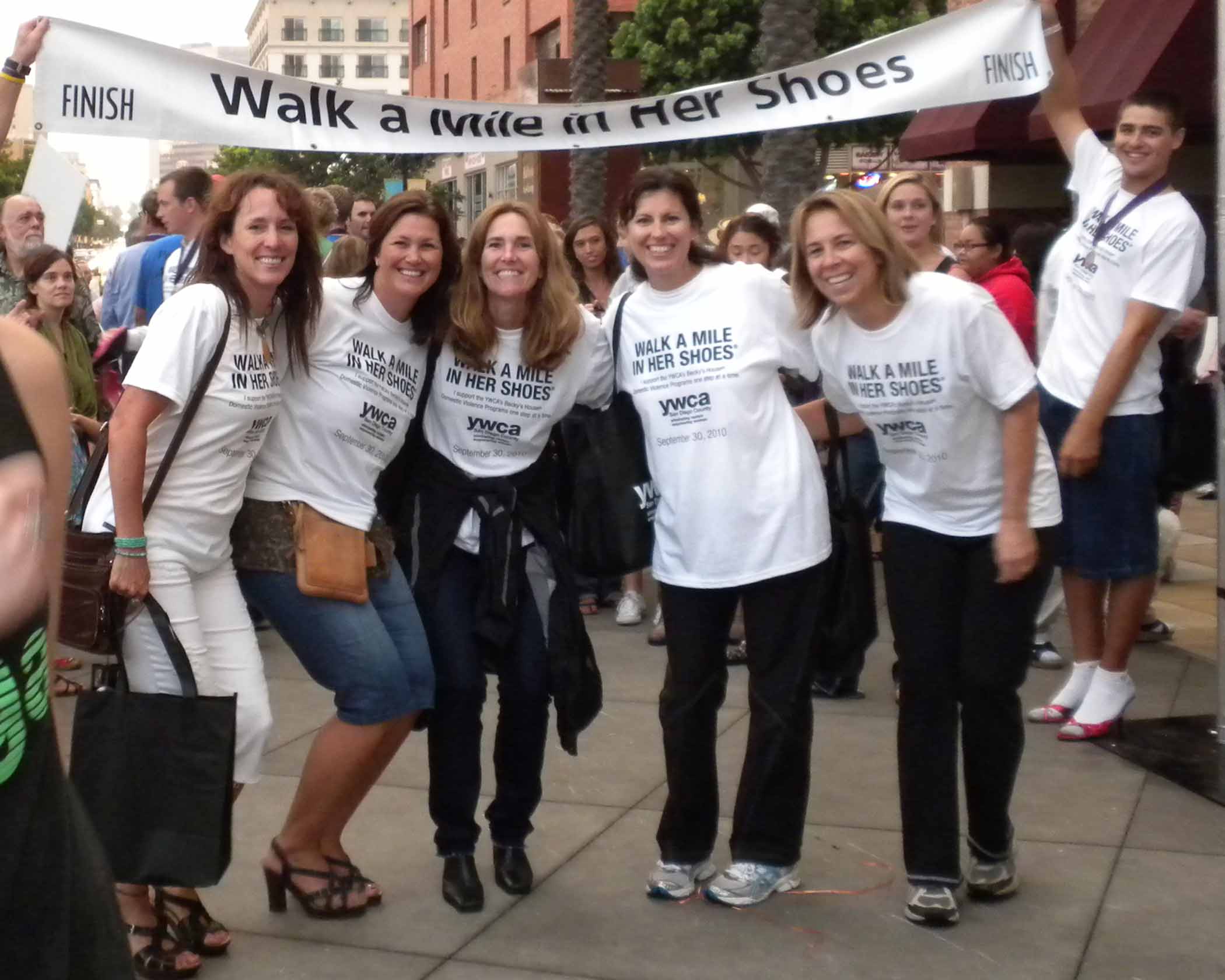Sisterhood conceptually is a bond between women. A bond where we celebrate each others unique perspectives and stand united in a state of shared solidarity.
It could be said that to obtain sisterhood is simple. Surround yourself with likeminded women–voila–the bond is there.
But really that mindset only trivializes the intention of sisterhood. The power of shared solidarity is derived in part by our dissimilarities and therefore needs to extend far beyond the boundaries of “people like me”. If I am only surrounded by likeminded people my growth as a human being is limited, if not stagnant, additionally I cut myself off from one of the most basic and important emotions; empathy.
Born in 1963, I was, and remain, a beneficiary of a great deal of trail blazing spearheaded by powerhouse feminists of the women’s movement. In many respects while growing up it did not occur to me that anyone had fought for my rights. I did not have women’s studies classes, or a mother who considered herself a feminist, in fact the opposite was true. Truth be told, I am an accidental feminist.
Yet even as I type the word, f-e-m-i-n-i-s-t, I am not confident that there are many feminists who would identify me as one of her own.
My mother, a woman who flew B-17 Bombers in WWII, ran a household, launched and managed her own business, did not relate to what, back then was called women’s lib, on any level. If anything she seemed to have disdain for the movement with remarks that led me to believe she thought of it as little more than radical extremism. So to say I grew up disconnected is an understatement.
I recall vividly the shock I felt when I learned in my early 20’s, while living in Florida, that there were people who worked to deny safe, legal access to abortion, my outrage was visceral, in response I volunteered to walk women past picket lines to the doors of Planned Parenthood.
Later, after moving to New Hampshire, I stood in support of keeping abortion safe and legal with countless others. We picketed the State Capitol building, attended hearings, signed petitions and wrote our state and local representatives. I went on to volunteer at a local shelter that supported victims of domestic violence. And even still, it never occurred to me that I was part of a feminist movement. In my mind it was simply unacceptable that a woman’s right to choose could be reversed.
I sought change, wanted to make a difference and did.
Life progressed as life does, one child born, a divorce, work, married again, two more children born and worked some more.
Throughout my 30’s into my mid 40’s, we had three children at home. My husband Jimmy and I both held offices outside of the house, my own career landed me square in the middle of a highly male dominated industry, home building.
Childcare ran the gamut. From in-home care to after school enrichment classes, we did it all.
Fortunately Jimmy’s profession was more conducive to the needs of our kid’s busy lives and subsequently he took the lead on almost everything that pertained to our children. I worked insane hours, made incredible money and was largely absent from nearly everything. It wouldn’t last forever, like so many industries, home building took a severe hit with the economics of 2007 and with it came the loss of my job. No Blackberry, no meetings, no wee hour report writing; it all ended when the company I worked for closed its doors in San Diego.
I did not seek another job outside the home instead, for reasons I won’t cover here, I wrote a book.
Today I write and I speak. And I read a lot. It occurred to me that although I have referred to myself as a feminist—an individual who supports equal rights on all levels, social, economic, political for all women—I feel very disconnected from aspects of feminism that I observe.
As I reflect back on my life I think of all the choices I have been privileged enough to make, I think of the incredible good fortune that is my life, a life where I have agency.
The myriad labels relied on to describe the roles women fill are too many to count, what’s more, the varying ways we perceive to handle them are even greater. When we opt toward narrow definitions of what it means to be a woman—feminine, feminist—it has great potential to strengthen or weaken our unity; there is no “one size fits all” definition because each woman has her own set of values, understandings and circumstances.
It seems to me that the new trend is to argue about feminism—who’s real, who’s not—as if any one of us were not real. The divisiveness created by this argument is enormous, it has led to the managing of our disagreement in a way which only serves to perpetuate the overdone female stereotype, women as adversaries.
Author, feminist and social activist, Bell Hooks, hit the nail on the head when she said;
If any female feels she needs anything beyond herself to legitimate and validate her existence, she is already giving away her power to be self-defining, her agency.”
Why would anyone ever give away their power—and—why would anyone feel the need to deny another woman’s right to her own agency.
It has been my experience that extending patience, compassion, empathy and forgiveness to myself has allowed me to harness my strength and confidence, and in turn provided me with the capacity to spread the same to others.
The mindset of beginning with self begs the question—If I were contagious, would I want to be caught?—how do I want to feel about what I give away, first to the woman I am, and second to all people.
The landscape of social interaction has changed with the advent of technology, in so many ways it provides us an incredible platform to align ourselves in the areas where our agreement overlaps; conversely, anonymity found behind the screen of a computer when we disagree unleashes judgment, which when uncensored, fuels a division between us that is as infectious as it is toxic.
In one example in the sea of articles written, Sharon Greenthal on April 21, 2013 wrote a piece for The Huffington Post, called, I Was A Stay-at-Home Mom — And My Marriage Survived. In it, among other things, she wrote about her role as a stay at home mom:
I gave all I had to my job so he could give all he had to his. That’s not to say that my husband wasn’t an active participant in our children’s lives — he was. He made a point of being at nearly every event, game, show or meeting possible.
Apparently, we were doing it all wrong, and we’re lucky we’re still married.”
Sharon went on to explain she had read an article written by Scott Behnson: “Why Dual Earner Families Have Less Divorce Than Single Earner Households.” Given Behsons’ research did not match her own experience Sharon was compelled to provide readers a different perspective, or simply put, share a slice of her story.
The eruption of comments that followed was staggering.
The cruelty, judgment and disdain exhibited by predominately women, simply put, shed a glaring spotlight on the chasm of differing opinions out there regarding the choices that people make whether to be a duel or single wage earner family raising children. More disturbingly it also unveiled the freedom with which as a gender, we wield words as weapons against each other.
I can’t help but wonder about the slippery slope we are headed down as a sex.
How do disparaging remarks about another woman’s personal choices made together and in agreement with her life partner about their life together serve us?
I contend they do not.
A world where people ultimately decide that sharing their personal experiences on line for fear of being lambasted and subsequently caught in a power struggle over who is the better woman seems antithetical to everything the quest for equality represents.
How will we ever get there if we ourselves seek power over one another?
I am reminded of the fabulous book written by Gloria Feldt, No Excuses: 9 Ways Women Can Change How We Think About Power, where she skillfully outlines our misconceptions about power:
Power tool #2: define your own terms—first, before anyone else does.
By redefining power not as power-over but as power-to, we shift from a culture of oppression to a culture of positive intention to make things better for everyone.
Imagine the positive intension that would be cultivated if we were to link arms and minds. If we supported other women emotionally, physically, personally and professionally, even when their choices don’t mirror our own set of standards.
Bringing power to means choosing a form of liberation that will lead us into the future with strength.
As women raising girls—if we were contagious, what would we want our daughters to catch—my hope for my own daughter is she catches the greater good born from women working in collaboration for the benefit of all women. It is my desire for her generation to rise above what seemingly is an adult’s version of schoolyard bully…if you aren’t like me then you are unworthy.
How incredibly counterproductive in our fight for equality.
We have enough obstacles to overcome then to willingly act as our own worst enemies. I may have begun as an accidental feminist but today it is a choice and I certainly do not have any interest in a brand of feminism that bars me for having the courage to use my voice and share a piece of what I have lived.
I am steadfast in my belief that the sky is big enough for every star to shine, if they don’t try to outshine each other, why should we? The essence of sisterhood is needed now more than ever and not just conceptually. Sisterhood to me is a bond between women, one where we celebrate each others unique perspectives and stand united in a state of shared solidarity.




I love this! I’m so, so sick of women trying to pigeonhole each other into roles they aren’t necessarily comfortable with or suited for in the name of either feminist ideals or religious dogma. I think that’s the reason this whole “can women have it all” has such a strong bite. I am not cut out for the corporate ladder. I am not cut out for the medical profession or for law. I am not made for anything that’s high pressure. That’s not insulting myself, it’s truth, and it’s a truth that I embrace fully. To do otherwise would mean misery for me and all kinds of issues for an employer. I’ve known mothers who stayed home because by the time they paid for childcare their paychecks were so tiny it was pretty pointless. I am a feminist because I believe in equal rights for women, but I also believe in equal rights for everyone. I’ve learned over the years that there is discord within many minority groups over what constitutes betrayal of their community. I’ve come to realize that this is an age-old issue within the female community, as well. It is divisive and serves only to make things worse for all of us. I can’t be a “feminist” if that label comes with terms and conditions attached. I spent way too much of my life reaching for unattainable approval. I finally got off that merry-go-round and I refuse to get back on. Feminism, if anything, should be about the freedom to choose to live our lives in a way that is meaningful to us as individuals.
Thanks for such a thoughtful post!
Thanks Edee, I appreciate so much your contribution and agree that conditions and terms prescribed by any group doesn’t resonate.